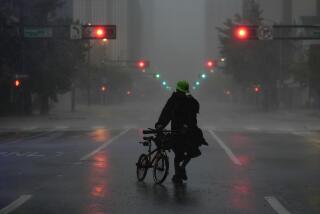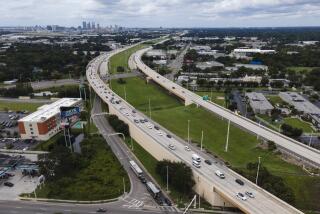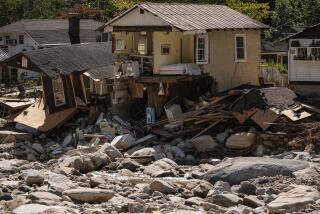Isaac now a hurricane; Army Corps says New Orleans is ready
Tropical Storm Isaac is now Hurricane Isaac -- and the Army Corps of Engineers says New Orleans is ready for it.
The storm reached hurricane strength late Tuesday morning, with the National Hurricane Center saying in an alert posted at 11:20 a.m. EDT: “Reconnaissance data indicate Isaac finally achieves hurricane status.’’
A big, slow-moving storm more than 350 miles wide, Isaac was plugging along at just 10 mph, moving northwest about 75 miles southeast of the mouth of the Mississippi River. Maximum sustained winds reached 75 mph, the Hurricane Center said, passing the 74 mph threshold for a Category 1 hurricane on the Saffir-Simpson hurricane scale.
PHOTOS: Tropical Storm Isaac is now Hurricane Isaac
As Isaac neared landfall, the National Weather Service’s Storm Prediction Center issued a tornado watch from southeastern Louisiana and coastal Mississippi eastward to the Florida Panhandle through Tuesday evening.
The tornado watch covers 11 Louisiana parishes, six Mississippi counties, three Alabama counties and seven Florida counties until 7 p.m. CDT.
The storm is on track to make landfall along the southeastern Louisiana coast by nightfall Tuesday, confronting New Orleans with a test of a levee and pump station system that failed during Hurricane Katrina in 2005. Those systems have been repaired, replaced or upgraded as part of a massive $11-billion inter-agency effort led by the U.S. Army Corps of Engineers as part of an ongoing $14.6-billion federal project.
“We took a lot of lessons learned from Katrina,’’ said Rene Poche of the Corps’ office in New Orleans. “We believe the system will perform as designed.’’
Upgrades to pump stations allow operators to remain safely on site, for instance; many operators were evacuated during Katrina, leaving pumping stations unstaffed. Pumping stations have also been outfitted with back-up generators and other fuel sources.
The upgrades include the world’s largest pump station, and a revamped pump system that can pump an inch of rain an hour for the first hour of a storm, and a half-inch every hour afterward, Poche said.
Some levees that stood only four feet during Katrina have been raised to 16 feet, with some flood walls as high as 30 feet. Because of levee foundation failures and “scouring’’ – erosion – of earthen levees during Katrina, foundations have been strengthened and armored, according to the corps.
The hurricane center has warned of storm surges of six to 12 feet, and rainfalls of up to 20 inches. Isaac is expected to linger, drenching low-lying areas with heavy rains and sustained winds.
Calling Isaac a “dangerous storm,’’ President Obama urged residents to evacuate if they’re asked to do so.
“Now is not the time to tempt fate,’’ the president said at the White House, stressing that flooding and other damage could be significant in southeastern Louisiana and other states along the Gulf coast.
“Now is not the time to dismiss official warnings,’’ he said.
ALSO:
No ice in Barrow, Alaska: Arctic ice shrinks to record low
NTSB: Plane’s tail structure likely caused Reno air show disaster
Sen. Schumer to House Speaker Boehner: Capitol dome must be fixed
More to Read
Sign up for Essential California
The most important California stories and recommendations in your inbox every morning.
You may occasionally receive promotional content from the Los Angeles Times.











